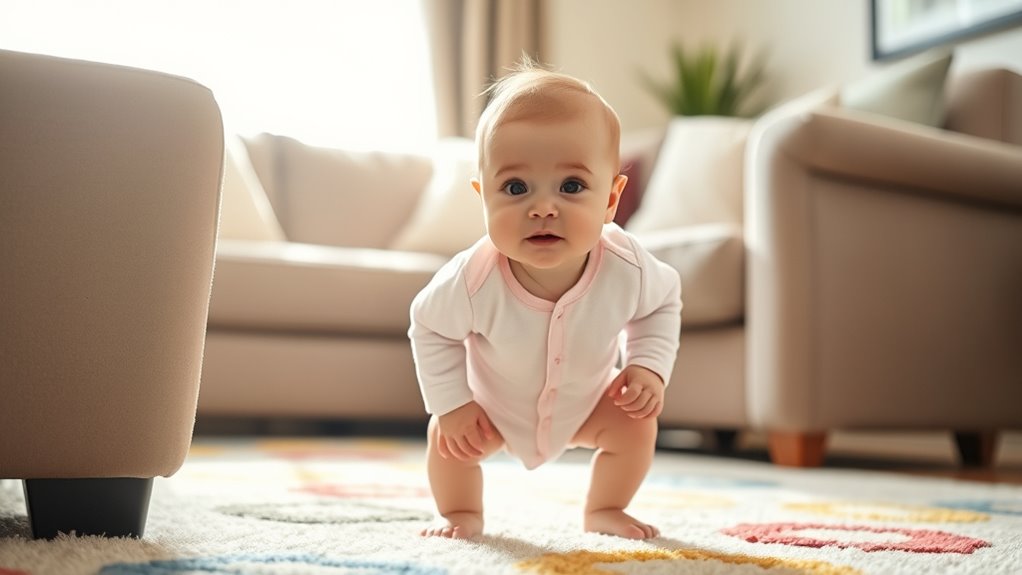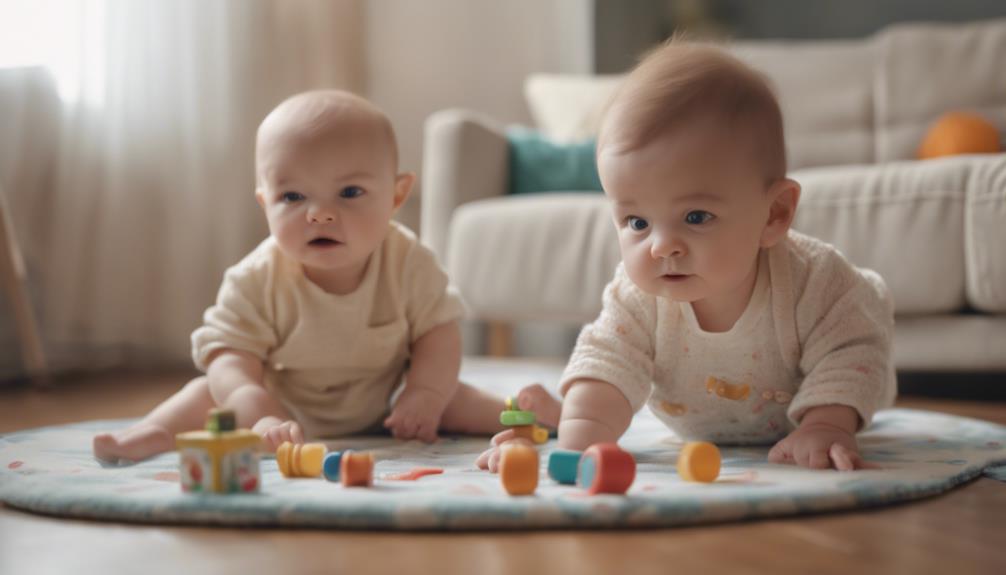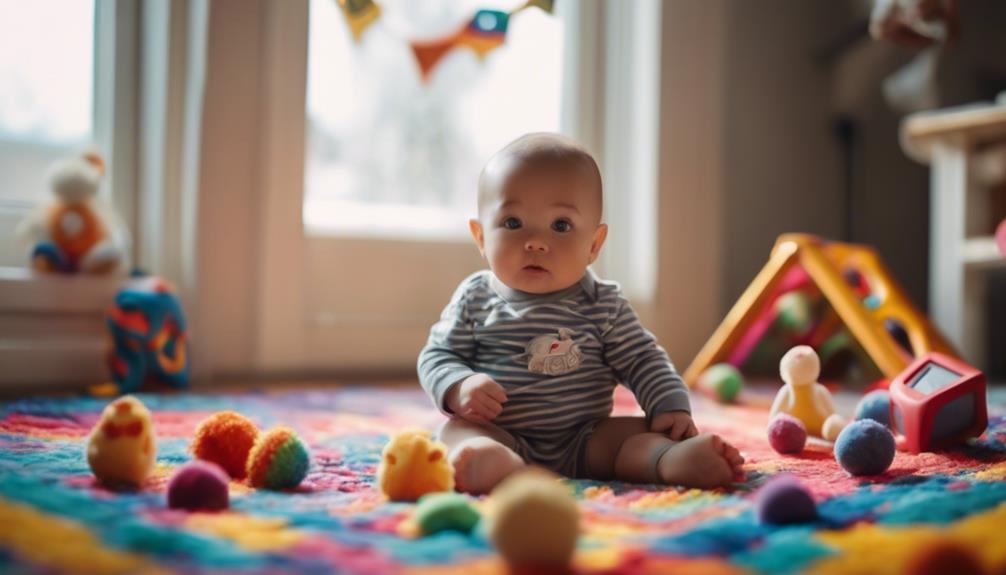If your baby isn’t walking by 15 months, don’t worry—every child develops at their own pace. Some babies skip crawling or take longer to take their first steps, and that’s usually normal. Focus on supporting their motor skills by encouraging safe exploration and celebrating small successes. If you’re still concerned, consulting a pediatrician can provide reassurance and guidance. Keep in mind, most children catch up — discover more ways to support their growth below.
Key Takeaways
- Many babies walk after 15 months; delays are often normal and not necessarily concerning.
- Factors like temperament, muscle tone, and environment influence walking age.
- Consult a pediatrician if your baby hasn’t started walking by 15 months for assessment and guidance.
- Supporting development with safe exploration and encouragement boosts confidence and motor skills.
- Every child’s growth timeline is unique; patience and positive reinforcement are essential.

Watching your baby take their first steps is a milestone filled with excitement and pride. It’s one of those moments that marks a significant step in their development, and naturally, you might be keen to see them walking confidently by 15 months. But remember, every baby develops at their own pace, and delays aren’t necessarily a cause for concern. Early crawling, for instance, is often seen as an important developmental milestone, and some babies skip this phase altogether, moving straight to standing or cruising. If your little one isn’t walking yet, it’s helpful to contemplate their overall progress rather than fixating solely on the timeline.
Many babies start crawling around 6 to 10 months, but some don’t crawl at all or do so later. This variation is normal and can depend on many factors, including temperament, muscle tone, and environment. If your baby is showing other signs of reaching developmental milestones—such as sitting without support, standing with assistance, or showing interest in objects at different heights—these are positive indicators that they’re on track, even if walking isn’t happening yet. It’s important to observe their overall motor skills and not just focus on when they take their first steps. Some children may be more cautious or simply prefer other methods of exploring their world, such as scooting or rolling.
If your baby isn’t walking by 15 months, it’s a good idea to discuss your observations with your pediatrician. They will assess their strength, balance, and coordination and may suggest activities or exercises to encourage walking. Remember, many children walk well past their first birthday without any issues. Sometimes, delays are linked to factors like muscle tone or coordination, which can often be addressed through simple interventions or physical therapy if needed. Keep in mind that some children are late bloomers but catch up quickly once they’re ready. Additionally, providing appropriate support and encouragement can make a significant difference in their confidence and motivation to walk.
In the meantime, focus on creating a safe, encouraging environment for your little one to practice their skills. Offer plenty of supervised tummy time, encourage them to stand with support, and allow them to explore different surfaces and objects that motivate movement. Your patience and support are key, and celebrating their efforts—regardless of whether they’re walking at 15 months—can boost their confidence and motivation. Every baby’s path is unique, and while milestones provide helpful guidelines, they’re not strict deadlines. Trust in your child’s natural progression and enjoy watching them grow and develop in their own time.
Frequently Asked Questions
When Should I Worry About My Baby’S Delayed Walking?
If you’re wondering when to worry about your baby’s delayed walking, remember that each child hits motor milestones at their own pace. Generally, if your baby isn’t walking by 15 months, it’s a good idea to consult your pediatrician. They can assess for developmental delays and recommend early interventions if needed. Trust your instincts, but professional guidance helps guarantee your little one gets the support they might need.
Are There Specific Activities to Encourage Walking?
Think of your baby’s journey as planting a seed; gentle encouragement helps it grow. You can foster walking by engaging in toddler exercises like supported standing and cruising, which build strength and confidence. Incorporate walking toys to motivate movement and make it fun. Keep activities playful and consistent, knowing each step forward is a sign of growth. Patience and encouragement turn small efforts into big milestones.
Could Genetics Influence My Baby’S Walking Timeline?
Genetic predispositions can influence your baby’s walking timeline, as developmental variations often run in families. While some children walk earlier or later naturally, genetics play a role in muscle strength and coordination development. Keep in mind, every baby is unique. If you’re concerned, consult your pediatrician, but remember that variations in walking age are normal and often influenced by inherited traits. Stay patient and supportive as your little one progresses.
When Should I Consult a Pediatrician About Walking Delays?
If you’re wondering when to see a pediatrician about walking delays, trust your instincts. You should consult a doctor if your baby isn’t meeting developmental milestones, like standing or walking by 15 months. Early intervention can be vital for addressing any issues promptly. Don’t wait too long—early support helps your child develop skills and confidence, ensuring they reach their full potential.
What Are Signs of Underlying Health Issues Affecting Walking?
Think of your child’s development as a delicate dance. If they show signs of motor skill delays or aren’t meeting developmental milestones, it might be a sign of underlying health issues. Watch for persistent muscle weakness, uneven gait, or difficulty standing. These signs could point to neurological or muscular concerns. If you notice these, consult a pediatrician promptly to guarantee early intervention and support for your child’s growth.
Conclusion
So, if your little one isn’t walking by 15 months, don’t panic. Maybe they’ll prefer crawling, or perhaps they’ll skip walking altogether and take up interpretive dance instead. After all, who needs steps when you’re already mastering the art of adorable wobbling? Just remember, your baby’s unique pace might turn out to be the perfect stride in their own time. Sometimes, the slowest steps lead to the most delightful destinations.









